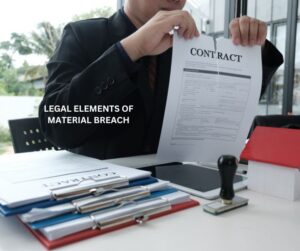In the intricate world of contract law, a material breach is a fundamental concept that every contracting party must understand. This type of breach occurs when one party fails to perform a contractual obligation, significantly impairing the value of the contract itself and undermining the purpose for which the agreement was initially made. Differentiating between a material and a minor breach is crucial as it determines the legal remedies available to the aggrieved party. By examining real-world examples of material breaches, parties can better understand their potential impact and how to effectively respond or protect against them.
Table of Contents
ToggleUnderstanding Material Breach

What makes a breach “material” in legal terms?
Legally, a breach is considered material when it results in substantial harm to the aggrieved party, affecting their ability to receive the benefits explicitly outlined in the contract. The determination of “materiality” can depend on factors such as the extent to which the breach has disadvantaged the non-breaching party, whether the breaching party can remedy the situation, and if the behavior of the breaching party aligns with standards of good faith and fair dealing.
Other Contract Law Issues
- The Economic Loss Rule in Texas
- Breach of Contract Statute of Limitations
- Tortious Interference With Contract
Legal Definition of Material Breach
A material breach happens when there is a significant violation of a contract that substantially harms the interests of the non-breaching party and defeats the primary purpose of the agreement. This type of breach goes to the essence of the contract, fundamentally disrupting the expectations that were central to the parties’ decision to enter into the agreement. In determining whether a breach is material, courts typically consider several factors, including:
- The Extent to Which the Injured Party Will Be Deprived of the Benefit They Expected from the Contract: If the breach results in one party not receiving the core benefits promised in the contract, it is likely considered material.
- The Extent to Which the Injured Party Can Be Adequately Compensated for the Part of the Benefit of Which They Will Be Deprived: If monetary compensation cannot adequately remedy the loss experienced due to the breach, this can indicate that the breach is material.
- The Extent to Which the Party Failing to Perform or to Offer to Perform Will Suffer Forfeiture: Courts will consider whether the breaching party will suffer disproportionately from penalties or lack of compensation.
- The Likelihood That the Party Failing to Perform Will Cure Their Failure: If there is a likelihood that the breaching party can rectify the breach, it may not be considered material.
- The Extent to Which the Behavior of the Party Failing to Perform Comports with Standards of Good Faith and Fair Dealing: A breach carried out in bad faith or in a deceptive manner is more likely to be deemed material.
These criteria help differentiate material breaches from minor breaches, which do not typically allow the non-breaching party to terminate the contract but may still entitle them to damages.
How to Proactively Prevent Material Breach of Contract
To proactively manage contracts and prevent potential disputes, parties should clearly define critical obligations and the consequences of failing to meet them. Reviewing contracts with a legal professional can help clarify these points and ensure that significant terms are enforceable and understood.
7 Examples of Material Breach of Contract
Here are seven practical examples of material breaches that commonly occur in contractual relationships:
- Non-Payment: If a party fails to make payment as stipulated in the contract, and the payment is substantial enough to affect the financial basis of the agreement, it constitutes a material breach. For example, failure to pay a significant invoice that cripples the supplier’s operations.
- Non-Delivery of Goods or Services: When a party fails to deliver goods or services on the agreed-upon date and this failure critically impacts the other party’s business operations. For instance, not delivering construction materials on schedule, causing a builder to miss construction deadlines.
- Substandard Quality: Delivering goods or services that fall below the quality standards specified in the contract, rendering them unfit for their intended use. An example would be a supplier providing subpar automotive parts that are not usable in production.
- Violation of Confidentiality: Disclosing confidential information in breach of a non-disclosure agreement can significantly harm the non-breaching party’s business interests and is considered a material breach.
- Non-Compliance with Legal Regulations: If a party’s failure to comply with relevant legal regulations leads to significant fines or legal issues for the other party, it would be considered a material breach. For example, a subcontractor failing to adhere to environmental regulations, causing the project owner to face legal penalties.
- Unauthorized Subcontracting: If a contract requires personal performance or specifies certain providers and a party unilaterally decides to subcontract the work to another provider without permission, it can constitute a material breach. This is particularly relevant in industries where personal expertise or reputation is critical.
- Breach of Exclusive Rights: If a contract grants exclusive rights or territories and one party violates these terms by selling outside the agreed boundaries or selling non-approved products, this can be deemed a material breach. An example is a distributor selling products in areas exclusively reserved for another distributor.
Each of these examples significantly impacts the contractual relationship, often justifying termination of the contract and legal recourse for damages.
Let’s examine two of the most common examples of material breach. Understanding specific scenarios where material breaches occur can illustrate the concept more clearly and help parties identify similar risks in their contractual relationships.
1. Non-Payment
Non-payment is a common example of a material breach if payment is central to the contract’s purpose. Failure to provide the agreed financial compensation can deprive the receiving party of the fundamental benefits of the contract, often justifying termination of the agreement and a claim for damages.
Is non-payment always considered a material breach?
Not always. The materiality of non-payment depends on the severity and the terms of the contract. If the contract stipulates that time is of the essence or assigns specific penalties for late payment, even a short delay might constitute a material breach.
Maintain precise records of payment deadlines, amounts due, and received payments. If discrepancies arise, these records will be crucial in proving the breach and quantifying damages.
2. Non-Delivery of Goods or Services
Another typical material breach occurs when a party fails to deliver goods or services by a date crucial to the contract’s terms. This failure can disrupt operations for the receiving party, significantly affecting their business.
How does the timing of delivery affect material breach?
The timing can be critical, especially in industries where deadlines are directly tied to a company’s operations, such as seasonal merchandise or time-sensitive projects. A delay beyond these critical periods can be deemed material.
When drafting contracts, explicitly state delivery dates and include clauses that outline the consequences of failing to meet these deadlines. Regular monitoring of contract performance against these deadlines can also help in early detection of potential breaches.
The Legal Elements of a Material Breach of Contract
You can prove material breach by establishing the following legal elements.

- Significance of the Breach: The breach must be significant enough to affect the fundamental terms of the contract. This is evaluated based on whether the breach defeats the purpose of the contract and deprives the non-breaching party of the primary benefits they anticipated.
- Impact on the Agreement: The breach must have a substantial impact on the agreement, disrupting the contractual exchange in such a way that the value of the contract, as originally agreed upon, is substantially diminished or destroyed.
- Inability to Remedy: The breach typically cannot be easily remedied or compensated for with money. If the breaching party can rectify the breach without significant harm to the non-breaching party, it might not be considered material.
- Good Faith and Fair Dealing: The breach often involves a failure to perform duties in good faith or a violation of the standard of fair dealing expected in the fulfillment of the contract terms.
- Intentionality: Sometimes, the intent behind the breach is considered, especially if the breach appears to be deliberate or malicious, further supporting the severity and materiality of the violation.
These elements collectively help to distinguish a material breach, which can justify the non-breaching party in terminating the contract and seeking damages, from a minor or immaterial breach, where the contract remains in force, and remedies are limited to damages not involving termination.
Legal Remedies for Material Breach
When a material breach occurs, the non-breaching party has several legal remedies at their disposal. These remedies aim to compensate for the losses incurred or to enforce the fulfillment of the agreement.
What are my legal options if I face a material breach?
The options include demanding specific performance (compelling the breaching party to fulfill their contractual duties), seeking damages for losses incurred, or terminating the contract entirely. The choice of remedy often depends on the nature of the breach and the specific terms of the contract.
If you suspect a material breach, consult with a business lawyer to evaluate your case and decide on the appropriate course of action. They can assist in gathering necessary evidence, negotiating settlements, or pursuing litigation.
Material breaches can significantly disrupt contractual relations and cause considerable financial harm. By understanding what constitutes a material breach and knowing how to document and respond to these incidents, parties can better protect their interests and maintain healthier business relationships. Regular reviews of contractual obligations, clear communication, and early legal intervention are key strategies in managing and mitigating the risks associated with material breaches.
Breach of Contract Lawyers
If you are dealing with a potential material breach or need assistance in drafting robust contracts that clearly outline obligations and remedies, consider seeking professional legal advice. A commercial litigation attorney can provide you with the guidance necessary to navigate complex contractual issues and protect your business effectively.
